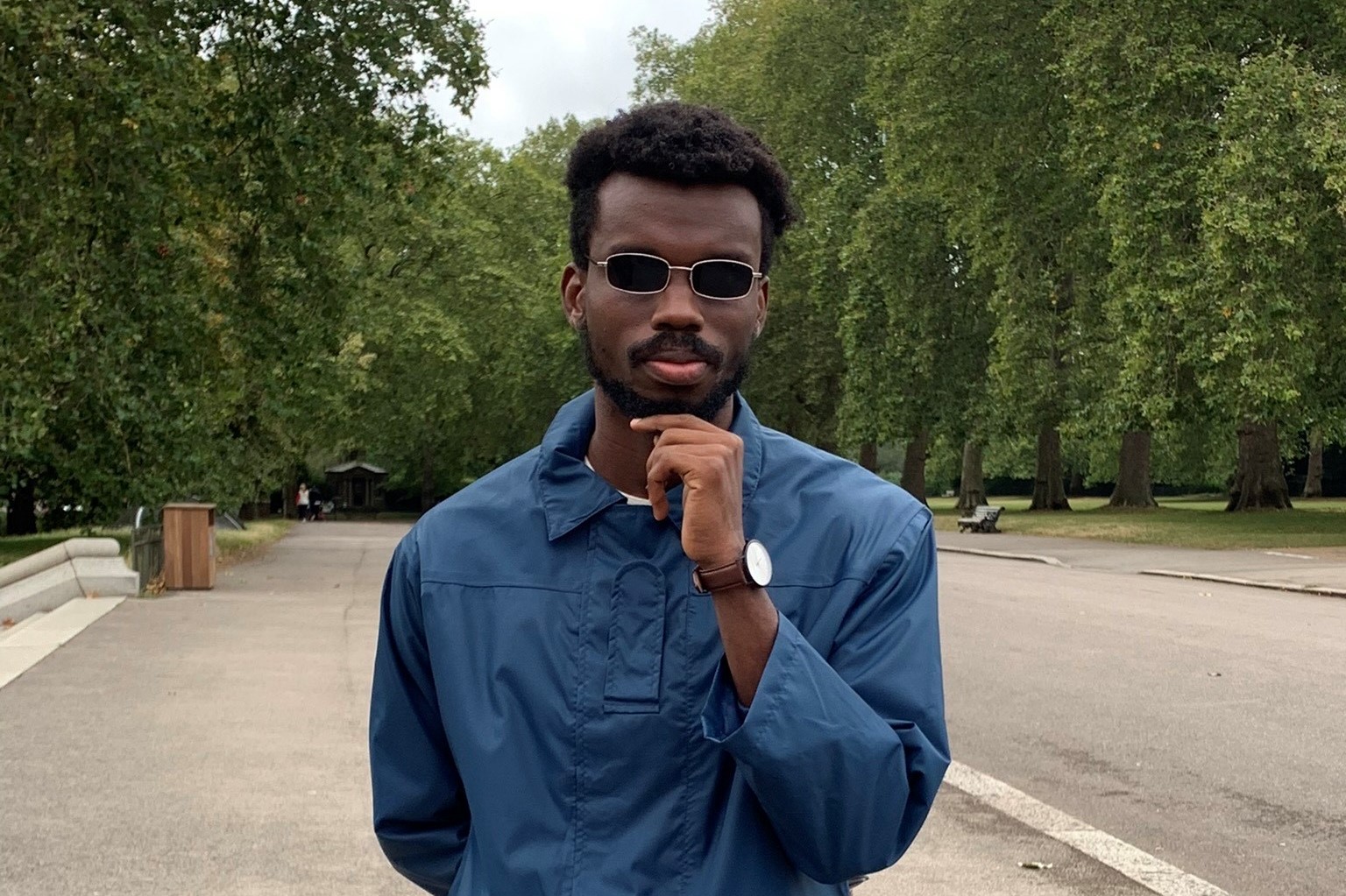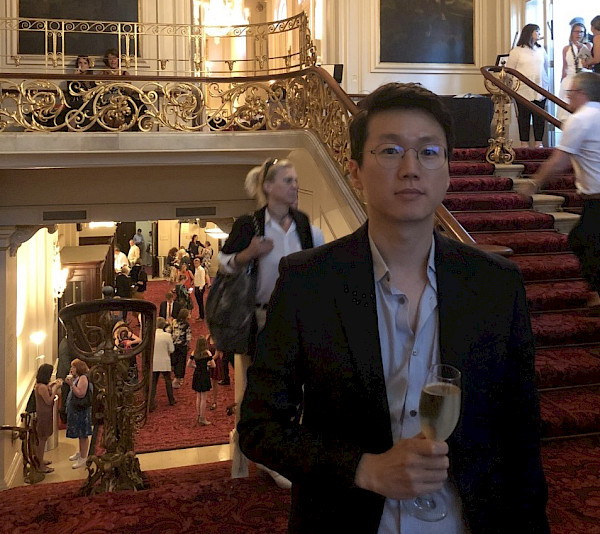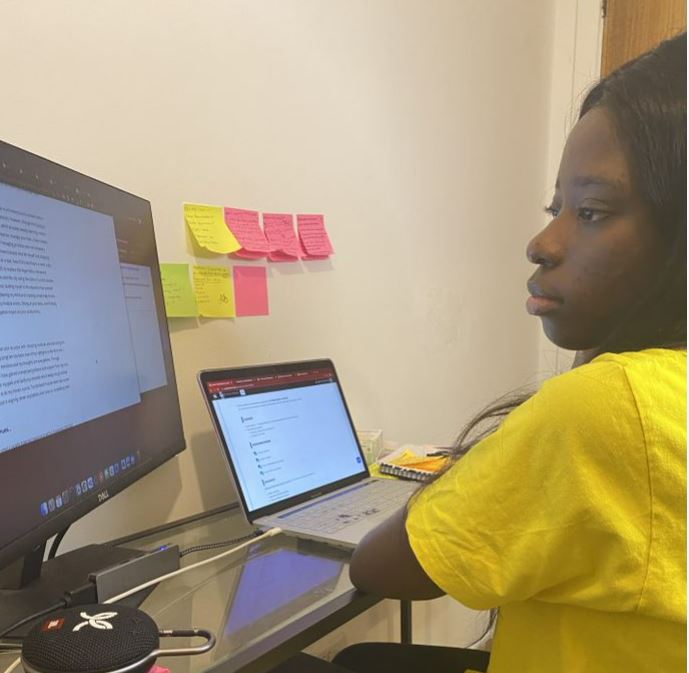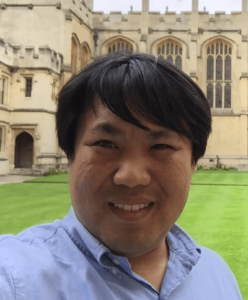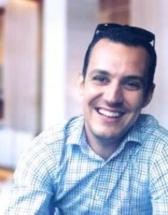The story of the contribution of one department to the life of the College, the development of computing technology and to the computer industry.
The first official reference to computing at Birkbeck can be found in the 1947-8 College Annual Report, which says: “An ambitious scheme is in progress for the construction of an Electronic Computer, which will serve the needs of crystallographic research at 21-22 Torrington Square; it will also provide a means of relieving many other fields of research in Chemistry and Physics of the almost crushing weight of arithmetic work, which they involve.”
The origins of these computing efforts at Birkbeck are inextricably linked with the names of J D Bernal, the great crystallographer, and his new assistant, Andrew Booth. Returning to Birkbeck at the end of the Second World War, Bernal started building a new research group to study crystallography. He appointed four assistants, one of whom was Booth, who was to lead on mathematical methods. Booth began by building his first electromechanical calculator, the Automatic Relay Calculator (ARC).
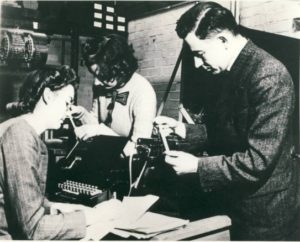
Kathleen Britten, Xenia Sweeting and Andrew Booth working on ARC in December 1946
A highlight of Booth’s early career at Birkbeck was an extended visit to the Institute of Advanced Studies at Princeton, where he was accompanied by Kathleen Britten, who would soon become his wife. The trip allowed the pair to work with John Von Neumann, one of the most influential early computer pioneers, and convinced them that the ARC should be redesigned in accordance with what is now commonly known as a “von Neumann” architecture. Together, Andrew and Kathleen wrote a widely-circulated paper entitled “General Considerations in the Design of an All-purpose Electronic Digital Computer” which examined the options then available for building each component. The construction of their first electronic computer, called SEC (Simple Electronic Computer), was completed around 1950. Andrew wrote up the project in his MSc dissertation, which appears to make him the first computing graduate at Birkbeck and hence the Department’s earliest alumnus.
The couple’s best-known machine, APEC (All-Purpose Electronic Computer), was designed in 1949. In 1951, BTM used its hardware circuits as the basis of the design of their HEC1 computer, which evolved directly by the end of the 1950s into the bestselling British computer, with a total of nearly 100 machines installed.

The BTM HEC1 Prototype in store at Birmingham Museum
Even in the days of cumbersome early machines, Andrew wrote about making computers available as widely as possible, securing a grant for a programme of research on “desk calculating machines” as early as 1949. A copy of his report evaluates the technical options for putting computers on, if not the desktop, at least the laboratory bench.
From the start, Kathleen was closely involved in the building and testing of the computers that Andrew designed. Getting these early machines to work involved a combination of testing the electronics and then checking that the programmes executed correctly. In 1953, they co-authored their best-known book, Automatic Digital Calculators, which ran to three editions. As part of her software development work, Kathleen developed a very early assembly language for their computers and in 1958 she published a book on software entitled Programming for an Automatic Digital Calculator.
The first of its kind
In 1957, a Governors’ Resolution stated that Birkbeck’s Computer Laboratory was to be constituted as a separate Department under the headship of Dr Andrew Booth. As far as can be made out, the Department of Numerical Automation was the first department established to teach computing in a UK university; elsewhere the courses were still taught in Computer Laboratories.
Andrew and Kathleen Booth stayed in the Department until the summer of 1962, when they moved to Canada. Andrew continued his career in computing initially at the University of Saskatchewan and subsequently as President of Lakehead University, Ontario.
Over subsequent years, the Department crossed many milestones: adopting the name Department of Computer Science in 1963; awarding MScs to 29 students in 1968; and appointing a chair in 1970. The College Calendar for 1970-71 is the first to acknowledge “Computer Staff” as a distinct group, comprising two programmers, two operators and four computer assistants who prepared paper tape and punched cards. At this time, the College’s IT support staff reported to the Head of the Computer Science Department. This arrangement continued for many years until a separate College Computer Service was created.
At the turn of the century, Birkbeck gave its highest accolade, a College Fellowship, to two members of its community who had made distinguished contributions to the advancement of computing. Firstly, in 2002, to Dame Stephanie Shirley, who created a major UK software house, whose workforce for many years was composed principally of women working from home and who has subsequently done much to promote the responsible application of IT and other charitable activities. Secondly, in 2003, it awarded a College Fellowship to Andrew Booth in recognition of his lifetime contribution to computing.
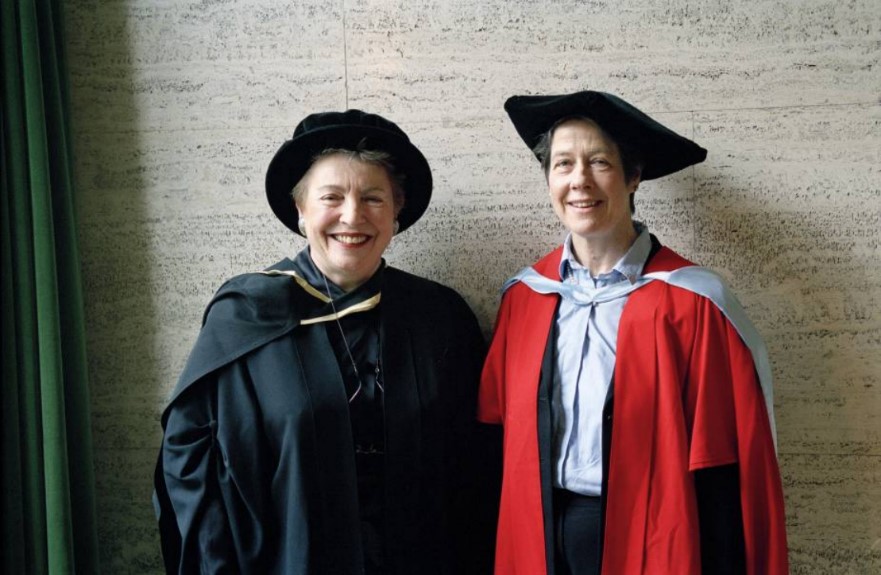
Dame Stephanie Shirley (left), on the occasion of her installation as a College Fellow in 2002 with Dame Judith Mayhew, Chairman of Governors.
The Department today
The Department of Computer Science and Information Systems’ research activities have continued to expand over the past twenty years, into advanced logics, computer vision, ontologies, personalisation, web technologies, and ubiquitous computing, with the appointment of several new members of academic staff.
In 2004, the Department set up the London Knowledge Lab in collaboration with the neighbouring Institute of Education. The Birkbeck Knowledge Lab established in 2016 extends this legacy, drawing on multi and interdisciplinary perspectives and methodologies to investigate how digital technologies and digital information are transforming our learning, working and cultural lives.
The Birkbeck Institute for Data Analytics was founded in 2016 to develop interdisciplinary research in data analytics and data science between computer scientists at the Department and members of Birkbeck’s other departments, across the sciences, social sciences, economics, law and humanities.
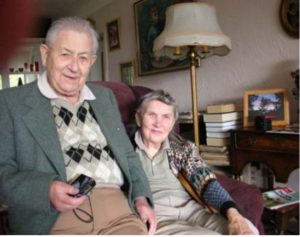
Andrew and Kathleen Booth in 2008
The Department celebrated its 60th anniversary in 2017, and the legacy of Andrew and Kathleen Booth continues to inspire generations of computer scientists. Each year, distinguished scholars and practitioners of computer science are invited to the College to deliver the Andrew and Kathleen Booth Memorial Lecture, which commemorates their pioneering work.
In 2018, Birkbeck became a founding member of the Institute of Coding, a national initiative established to address digital skill needs in industry sectors in key areas including data science, cyber security, artificial intelligence, and coding. Through our part time evening face-to-face model of delivery, Birkbeck is well placed to support those already in employment and has developed new full and part time programmes in Data Science to address the digital skills gap in this area. The Department has also established a relationship with industry through our partnership with the British Library and National Archives, where we jointly develop a PGCert in Computing for Cultural Heritage to help upskill their respective workforce and address the need for digital skills, such as programming, to manage the large volumes of digitised documents being made available for research and to the public as part of our digital economy.
The discipline of Computer Science is never dull. Rapidly evolving technology is always opening up new application areas, while new challenges from the real world drive technology developers to continually push the frontiers forward. We look forward to what the next 60 years will bring.
This article was adapted from the School of Computer Science and Information Systems: A Short History by Dr Roger Johnson, which was originally produced for the Department’s 50th birthday celebrations.
Department of Computer Science and Information Systems Timeline
1947 Andrew Booth and Kathleen Britten undertake a six-month US tour based at Princeton, where they work with early computer pioneer John Von Neumann.
Andrew Booth secures funding from the Rockerfeller Foundation for a computer to carry out natural language translation.
1948 Andrew Booth designs the Simple Electronic Computer.
1951 Andrew Booth is Birkbeck’s first computing graduate.
BTM’s HEC1, based on Andrew Booth’s Circuitry, is built.
1955 The Birkbeck Computer Laboratory gives a public demonstration of machine translation.
1957 The Department of Numerical Automation is officially established.
Andrew Booth is elected to serve on the first Council of the British Computer Society.
1958 Kathleen Booth’s book Programming for an Automatic Digital Calculator is published.
1961 International Computers and Tabulators Ltd. provide the Department with an I.C.T. Type 1400 computer, worth just under a quarter of a million pounds.
1967 The Chair in Computer Science is established.
George Loizou (now Emeritus Professor), joins the Department as a Lecturer.
1968 29 students are awarded MScs, seven with distinction.
1971 Betty Walters is appointed Department Secretary, where she will serve for over 36 years.
1973 The Department takes part in a College Open Day, offering specialist equipment demonstrations. The then Secretary of State for Education, Margaret Thatcher, is among the attendees.
1983 Dr Roger Johnson (now Fellow of the College) joins the Department.
1987 The Department plays a major role in organizing the Very Large Data Base Conference in Brighton, which will host 700 delegates from all over the world.
1992 Dr Roger Johnson serves as President of the British Computer Society.
2002 Dame Stephanie Shirley is made a Fellow of the College in recognition of her distinguished contributions to the advancement of computing.
2003 Andrew Booth is made a Fellow of the College in recognition of his lifetime contribution to computing.
2004 The London Knowledge Lab is established in partnership with the Institute of Education.
2008 The first degree programmes are offered on Birkbeck’s Stratford campus.
2009 The School of Business, Economics and Informatics is established. The Department of Computer Science and Information Systems becomes one of four in the School.
2016 Birkbeck Institute for Data Analytics is founded.
2017 The Department celebrates its 60th anniversary.
2018 Birkbeck is a founding member of the Institute of Coding.
2020 The Department of Computer Science and Information Systems offers twelve scholarships to the PG Cert Applied Data Science for black and female candidates in order to widen representation in computing.
Further Information

